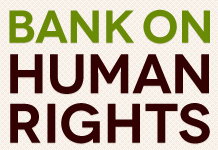Bank on Human Rights coalition challenges draft World Bank safeguard proposal
Bank on Human Rights, a global coalition of nongovernmental organizations, social movements, and community groups said that the leaked draft of the World Bank’s proposed new social and environmental policies reveals significant erosion of protections for communities and the environment. The coalition sent a statement to the World Bank on July 28, endorsed by 15 human rights organizations.

The World Bank has reeatedly committed to producing a new safeguard framework that results in no-dilution of the existing safeguards and which reflects prevailing international standards. Instead, the draft safeguard framework distributed this month to the Committee on Development Effectiveness represents a profound dilution of the existing safeguards and an undercutting of international human rights standards and best practice among development institutions.
Though there are several areas where language has been improved, such as the expansion of social risks and impacts to expressly include, among other issues, discrimination, inclusion and accessibility, the fact that the proposed framework itself moves from one based on compliance with set processes and standards, to one of vague and open-ended guidance, threatens to render these technical improvements meaningless. Approving this draft for consultation would send a message that the Bank and its member states are willing to abandon their obligations to ensure that their investments do not result in human rights violations. This is despite repeated calls, by CSOs and governments alike, for a strengthening of the safeguards and respect for globally recognized human rights standards.
The Coalition urged the World Bank to reject the proposed draft and sent it back for revision to address the following fundamental flaws:
1) The Social and Environmental Framework provides more carve-outs than coverage
- New opt-out provision in the Indigenous Peoples Standard renders the policy meaningless in the very circumstances where it is most needed.
- Borrower systems may replace application of the safeguards, with no clear minimum standard or process for determining their adequacy.
- Projects involving financial intermediaries, co-financing, associated facilities funded by other agencies, and existing facilities or activities are eligible to bypass the substance of the safeguards so long as they do not “materially deviate from the objectives of the ESSs.”
- Sub-projects classified by borrowers as Substantial Risk need only comply with national laws, not the safeguards.
- Labor and Working Conditions Standard excludes contract and sub-contracted workers and only provides partial coverage for government civil servants, leaving the majority of workers in Bank-financed projects unprotected.
- Involuntary Resettlement Standard excludes land titling/regularization activities as well as regional and national land-use planning, leaving widespread displacement impacts uncovered.
2) Distorts international human rights standards and undermines prevailing development institution practice
- No commitment to respect human rights or to ensure that Bank-financed projects do not contravene borrowers’ international legal obligations. Reference to human rights in the vision statement is unenforceable, limited in scope, and takes for granted that the “Bank’s operations are supportive of human rights and will encourage respect for them” without providing a framework for actually ensuring this.
- “Alternative approach” in the Indigenous Peoples Standard ignores indigenous peoples’ human rights, only requiring treatment “at least as well as other projectaffected people.” Additionally, while the Indigenous Peoples Standard states that Free, Prior, and Informed Consent (FPIC) must be obtained in certain scenarios, it fails to outline the procedural requirements of FPIC as articulated under international law.
- Labor and Working Conditions Standard ignores Core International Labor Organization Standards, leaving out protections for freedom of association and collective bargaining.
- Provisions regarding discrimination leave out discrimination on the basis of race, color, language, and political or other opinion.
- Involuntary Resettlement Standard fails to ensure that projects resulting in physical or economic displacement have a legitimate public interest purpose and that there are no viable alternatives, consistent with international law.
3) Abrogates Bank responsibility for ensuring projects do not harm people or the environment
- Significantly shifts responsibilities for impact and alternatives assessment, risk classification, and stakeholder engagement to the borrower, without clarity on the content of the Bank’s due diligence or monitoring and supervision.
- Critical planning instruments, such as the Indigenous Peoples Plan and Involuntary Resettlement Plan, are no longer required prior to appraisal by the Bank and as key determinants of Bank support for the project.
4) Offers little protection or recourse to project-affected communities
- Time-bound requirements for key document disclosure and participatory planning processes are eliminated, including disclosure of the environmental and social assessment.
- Baseline socio-economic studies, which are indispensable to resettlement planning, monitoring, evaluation, and restitution, are no longer required.
- Lack of hard compliance requirements or clear standards make it extremely difficult for communities to monitor projects and to know what rights they have. This also undermines the ability of the Inspection Panel to enforce the safeguards.
To read the full coalition statement to World Bank directors and list of signing organizations, please visit here.
Bank on Human Rights is a newly formed global coalition of social movements, civil society organizations, and grassroots groups working to ensure that all development finance institutions respect, protect, and fulfill human rights. It was co-founded by the International Network for Economic, Social and Cultural Rights (ESCR-Net), which continues to serve on its steering commitee. For more information, please visit http://bankonhumanrights.org/ or contact Gretchen Gordon, Coordinator on the Bank on Human Rights, email: ggordon@bankonhumanrights.org
